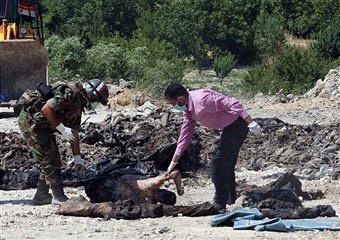 Syria is still ablaze and the West seems unable to do douse the flames. And the risk of
the Assad regime committing even greater violence will increase when the world’s media moves on.
Syria is still ablaze and the West seems unable to do douse the flames. And the risk of
the Assad regime committing even greater violence will increase when the world’s media moves on.
The reasons for Western impotence are manifold. First, for a long time Western leaders thought they could reason with Assad and therefore shied away from direct pressure. When they decided to act, they discovered that Assad is immune to European pressure because Syria does little trade with Europe.
But, crucially, many Syrians are either loyal to the regime or fear triggering disintegration of the sort they have seen in neighbouring Lebanon and Iran. Finally, unlike Libya, the Syrian regime is not hated by fellow Arab states. Many Arab governments distrust Assad and would not mind seeing the back of him, but they won’t exert themselves in the process.
Room for Western manoeuvre may be limited, but there is still more the British government can do. The government could indicate that Bashir al-Assad has no future governing Syria; and nor do his cohorts. Foreign Office minister Alistair Burt has begun to strengthen the official language, but the government can go further.
Second, the government should recall the British ambassador as a sign that Syria is no longer a regime the UK can have normal relations with. Recalling the ambassador for an indefinite period, and pressuring other European states to do the same would be an important move, ramping up pressure on Syria. If all 27 EU member-states recalled their ambassadors, alongside Turkey, Damascus would sit up and notice.
Then the government should help facilitate a large-scale, high-profile conference for the Syrian opposition movements, helping them to organise themselves and send a signal that a future without the Assad regime does not mean chaos; indeed, that it could lead to an inclusive democracy.
Third, the government should persuade Cathy Ashton to appoint a War Crimes ambassador, preferably a prosecutor, who would begin assembling information about the atrocities that have taken place. His findings could then be transmitted to the ICC, should it be tasked to investigate at some point.
Finally, the government should work with Turkey, Tunisia, Egypt and its European allies to rally the UN General Assembly for a vote condemning Syria. The UN Security Council is unlikely to act robustly, given Chinese and Russian reticence, but building pressure through the General Assembly will be helpful.
The West has few options in Syria; but it still has some. It should use them before more people die.






Comments